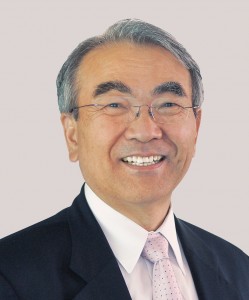 The Inamori Foundation has named Takeo Kanade, the U.A. and Helen Whitaker University Professor of Robotics and Computer Science, as the winner of the prestigious 2016 Kyoto Prize for Advanced Technology, citing his pioneering contributions to computer vision and robotics.
The Inamori Foundation has named Takeo Kanade, the U.A. and Helen Whitaker University Professor of Robotics and Computer Science, as the winner of the prestigious 2016 Kyoto Prize for Advanced Technology, citing his pioneering contributions to computer vision and robotics.
The international award is presented to individuals who have contributed significantly to the scientific, cultural and spiritual betterment of humankind.
“I am most honored,” Kanade said following the announcement. “Since I came to CMU in 1980, soon after the Robotics Institute was founded, I have participated in and led many exciting projects. My students, colleagues and the environment at CMU made them happen. In fact, it may sound funny, but, honestly speaking, all I had was fun.”
Kanade will receive a gold medal and a cash award of 50 million yen (about $480,000) at a Nov. 10 ceremony in Kyoto, Japan.
“Dr. Kanade has made fundamental contributions to the basic theory of computer vision and introduced a series of innovative applied technologies in robotics, including pioneering achievements in the field of automated driving,” the foundation said in its announcement. “He has established the foundation of this academic field and been advancing its frontiers consistently for many years.”
Kanade joined the Robotics Institute and the Computer Science Department in 1980 and was director of the Robotics Institute from 1992-2001.
He made fundamental discoveries in face detection technology, automated driving, three-dimensional image reconstruction, self-flying helicopters and the use of video images to estimate the direction and speed of moving objects.
But his research breakthroughs began much earlier. While he was a student at Kyoto University in the early 1970s, he developed the first complete system for face recognition by computers for his doctoral thesis. Since then, he has continued to explore the science of computer vision, including the physical, geometrical, optical and statistical processes involved in vision.
In the early 1980s at CMU, he founded and led NavLab, a pioneering project that developed techniques for a vision-based autonomous car, including lane keeping, automatic parallel parking and object detection. NavLab produced a series of self-driving vehicles, including NavLab 5, a minivan that steered itself on a cross-country tour called “No Hands Across America” in 1995.
He co-developed the world’s first direct-drive robot arm, which is used by several robot manufacturers and is recognized as one of the most advanced robot arm technologies. Applications of his algorithmic insights, mathematical and physical principles, and rigorous implementation include medical robots for surgical assistance, “virtualized reality” systems for capturing and visualizing three-dimensional scenes and modern graphics effects in video. CBS used a version of his virtualized reality to provide 360-degree replays during its 2001 telecast of the Super Bowl.
He is the recipient of many awards for his work, including the Franklin Institute’s Bower Award and Prize for Achievement in Science in 2008, the ACM/AAAI Allen Newell Award and the Okawa Prize in 2007.
Born in Tamba, Hyogo, Japan, Kanade earned a Ph.D. in electrical engineering at Kyoto University in 1974. He served on the Kyoto faculty until he joined Carnegie Mellon.
Kanade has appointments at the Institute of Scientific and Industrial Research at Osaka University and at the Nara Institute of Science and Technology, Japanese national university in Kansai Science City. He also is a senior adviser at the Center for Advanced Integrated Intelligence Research at RIKEN, Japan’s largest comprehensive research institute.
In addition to Kanade’s prize, the foundation announced that Tasuko Honjo, a medical scientist at Kyoto University, and Martha Craven Nussbaum, a philosopher at the University of Chicago, will receive this year’s Kyoto Prizes, respectively, for basic sciences and for thought and ethics.
Previous Kyoto Prize winners with CMU connections include Ivan Sutherland, who won in 2012 and received a bachelor’s degree in science at Carnegie Tech in 1959; and Robert Heath Dennard, who won in 2013 and received his Ph.D. in electrical engineering in 1958.